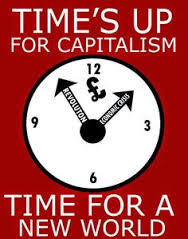Faced with a social system which creates problems faster than its politicians can make promises, responses range from the stupidly complacent to those whose self-righteous radicalism leaves no time for actually solving the problems they shout about. Would-be "leaders" the world over, rush to defend the indefensible. Political parties compete to run a system of organised poverty and obscene contradictions, which has built weapons to destroy humanity while millions starve. Most political debate is as irrational as the system of class division and profit which, in one form or another, it seeks to defend. It is therefore very refreshing indeed when a glimmer of social sanity shows itself through this dense fog of doublethink. The Socialist Party is made up of men and women who have kept alive the vision of socialism as a society of personal freedom, communal solidarity, production for use and free access to goods.
Socialism is possibly the most abused, misused, and misunderstood term in the English language. So to explain our understanding of what it means visualise a completely different economic, world-wide system of society. Within this system, all the means of production and distribution that exist on the face of the earth will be owned and democratically controlled by the whole of society. Each person will stand in exactly the same economic relationship with the instruments for producing and distributing wealth. There will be no class owning and there will be no non-owning class—it will be a classless society. Goods and services will be produced and distributed solely for use and not for profit. People will contribute according to their individual abilities, taking from society according to their needs. This means literally free access to whatever they require. Visualise then a system in which there will be no means of exchange, no money, no barter. A system wherein there will be no capitalist class paying wages, with no employers or employees. Such a system cannot operate in one country, as no one country is economically self-sufficient; nor can it be inaugurated until the vast majority understand its economic and social implications.
In a society wherein the vast majority are non-owners of wealth production and distribution and a minority are the owners, a conflict of interest must exist. We acknowledge the absolute necessity of trade unions under capitalism, and we support the active participation of workers within the trade union movement in their attempts to safeguard and improve, their wage levels and working conditions. At the same time, we also fully realise the limitations of trade unions. We are the sole advocates of the highest expression of the class struggle on the political field—the demand for the abolition of class society, together with the class struggle, through the establishment of socialism.
The key to capitalism's closely guarded secret —the appropriation of surplus value by the capitalist class— is that most workers spend a lifetime blissfully unaware of the fact that as a class they are being legally robbed when they produce values equal to their pay cheques, but then continue producing excess values for the bosses.
The four key features of socialism are:
Production will be for use and not for sale on the market.
Distribution will be according to need and not by means of buying and selling.
Labour will be voluntary and not imposed on workers by means of a coercive wages system.
A human community will exist and social divisions based on class, nationality, sex or race will have disappeared.
The Socialist Party is for those who have seen through the nonsense of the profit system and who clearly stand for the abolition of capitalism in any of its forms, whether private or state-controlled and its replacement by a system of production for use, with human needs being met through free access to all goods and services. The Socialist Party explains its ideas in a historical context which makes them all the more powerful and urgent. Moreover, it is demonstrated that capitalism really does "produce its own gravediggers", as various groups at different times and places have independently reached (and continue independently to reach) the same conclusion - that since the problems of the working-class majority cannot possibly be solved through the reform of the capitalist system, therefore it must be replaced.
The means of production must either function as capital throughout the world (in which case wage labour and capitalism persist internationally) or they must be commonly owned and democratically controlled at a global level (in which case they would be used to produce wealth for free, worldwide distribution). The changeover from world capitalism to world socialism will have to take the form of a short, sharp rupture (a revolution), rather than a gradual extended process of cumulative transformation.

.jpg)






